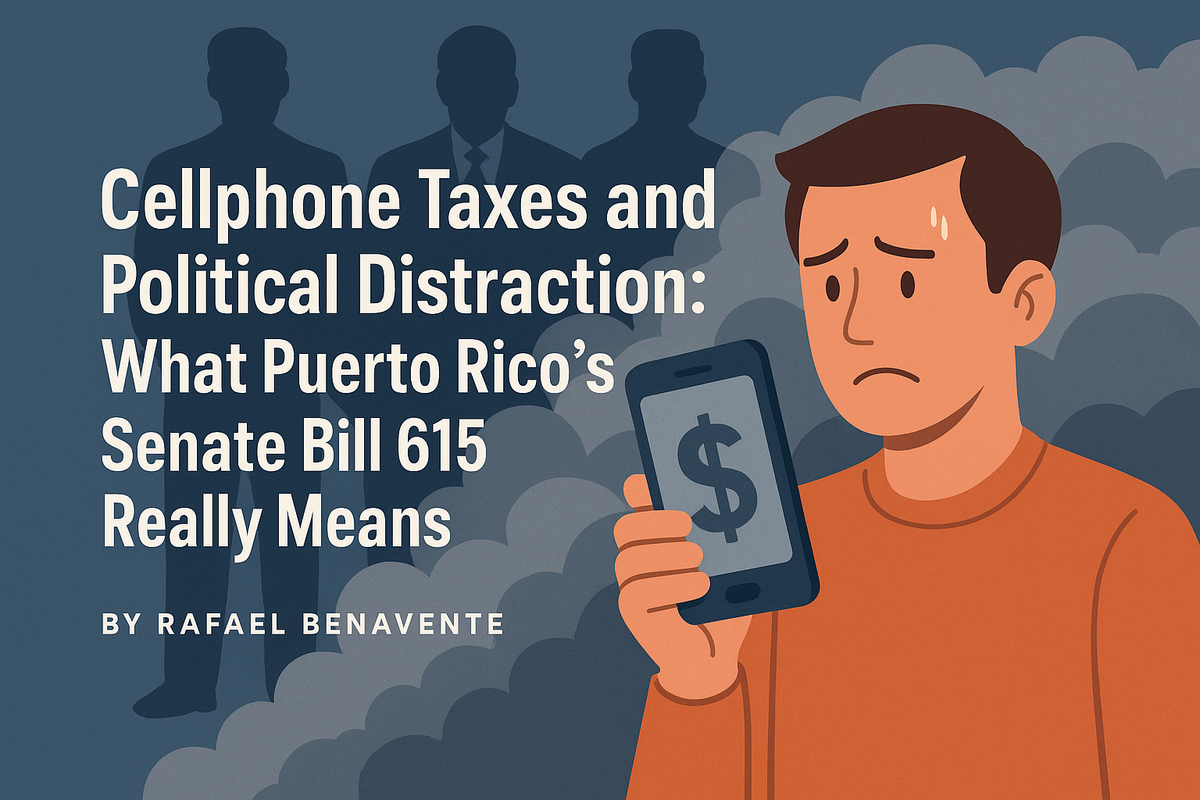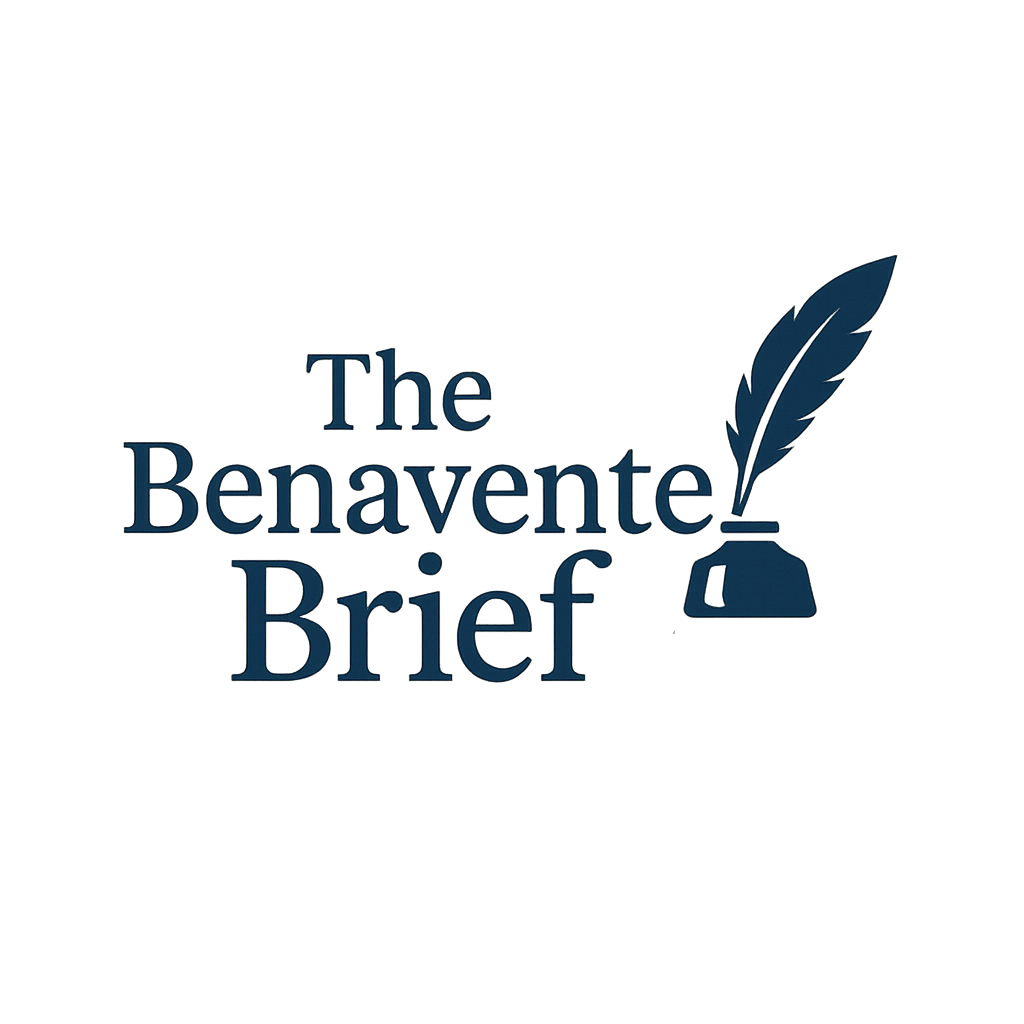"El Cuido Was Right: The Real Story Behind Puerto Rico’s Cellphone Tax"
In recent weeks, Puerto Rico has been caught in a heated public discussion over a proposed new cellphone tax embedded in Senate Bill 615. At first glance, the media frenzy seemed to center around consumer costs—how much more we’d all be paying each month just to own a phone number. -Rafael Benavente

Cellphone Taxes and Political Distraction: What Puerto Rico's Senate Bill 615 Really Means
By Rafael Benavente | Inspired by El Cuido
Introduction: The Cellphone Tax Isn’t What It Seems
In recent weeks, Puerto Rico has been caught in a heated public discussion over a proposed new cellphone tax embedded in Senate Bill 615. At first glance, the media frenzy seemed to center around consumer costs—how much more we’d all be paying each month just to own a phone number. But as Puerto Rican commentator and YouTube host from El Cuido revealed, this entire issue may be a smokescreen for something much bigger and more troubling.
This blog breaks down the key revelations from El Cuido’s analysis and exposes what may really be happening behind the scenes: a quiet restructuring of municipal financial power, salary increases for mayors, and the erosion of oversight and transparency.
🎥 Credit: This post is based on insights shared in the El Cuido YouTube channel’s July 2025 video.
The Surface Narrative: A Cellphone Tax for Infrastructure?
At face value, Senate Bill 615 appeared to define new "voice channel" fees that would allow municipalities to charge telecom companies more money per user. The idea was spun in media circles as a measure to ensure "fair competition" among providers and to give local governments more tools to raise revenue.
Jay Fonseca, a well-known journalist, pointed out in the clip that the bill’s language was intentionally vague. The definition of a “voice channel” was so broad that it essentially allowed any municipality to charge up to $3,000 per connection—or possibly even per line. This could mean huge revenue from companies like Claro, Liberty, or T-Mobile.
But the public didn’t know that buried deep in the language of the bill was a significant restructuring of local government power.
The Real Play: Massive Salary Increases for Mayors
According to El Cuido, just days before the cellphone tax conversation took center stage, another piece of legislation quietly opened the door for mayors to raise their own salaries—without the need for public hearings. That’s right: the same bill that discussed taxing your cellphone usage also removed the requirement for public hearings around elected officials giving themselves pay raises.
In a matter of weeks, municipalities went from claiming they were fiscally endangered to pushing for self-approved salary increases. And when the Fiscal Oversight Board denied direct financial aid to over 30 struggling municipalities, a workaround emerged: extract more money from telecoms and indirectly from consumers.
The Bait and Switch Strategy
El Cuido presents a compelling timeline:
- June 17, 2025: Bill introduced to allow mayors to request salary increases.
- June 25, 2025: Municipalities are denied financial aid.
- July 2025: Cellphone tax debate dominates headlines.
This timeline suggests the tax wasn’t about equalizing telecom policy. It was about finding a new revenue stream that could fund the raises local officials had already approved for themselves. And all this while avoiding public hearings.
What’s in Senate Bill 615?
Here’s what the bill actually does, according to the analysis:
- Defines “voice channels” broadly to enable large telecom levies.
- Removes public hearing requirements for mayoral salary increases.
- Lifts restrictions on competitive bidding for municipal contracts.
- Enables expropriation of “public nuisance” properties with little oversight.
The cellphone tax, it turns out, was a classic misdirection tactic—drawing media and public scrutiny away from far more invasive legislative changes.
Why This Matters to Everyday Puerto Ricans
Let’s break down how this affects the average citizen:
- You’ll pay more on your phone bill. Even if it’s “only $5–$10 more per month,” as the bill's supporters claim, that adds up across the island.
- Your mayor can now raise their salary without input. Imagine getting to choose your own raise—no votes, no HR approval.
- Government contracts may become even more opaque. No more required public bids could mean sweetheart deals, favoritism, and reduced accountability.
- You could lose your home more easily. The bill allows municipalities to label properties as public nuisances without standard safeguards, opening the door to potential abuse.
The Real Cost: Loss of Trust
The most damaging element isn’t financial—it’s ethical. When government leaders pass legislation in ways that obscure their intentions, it undermines democratic trust. As El Cuido bluntly puts it: “Mientras todo el mundo está mirando para acá, nosotros metemos un montón de cosas por acá.” (“While everyone’s looking over here, we slip a bunch of things in over there.”)
When elected officials vote on bills without reading them, as some senators admitted during media interviews, we’re not just dealing with negligence—we’re dealing with institutional decay.
Deflection and Denial
Politicians were quick to claim the new charges weren’t technically taxes—just “fees.” But whether labeled a tax, surcharge, or adjustment, the bottom line is the same: you’ll pay more, and they’ll earn more.
During his breakdown, El Cuido plays clips from various senators fumbling to explain or defend their positions. One particularly damning moment includes an official dodging the question of whether the bill was passed “por descargue”—a procedure used to skip committee scrutiny and public comment.
The Bigger Picture: A Pattern of Deception?
The cellphone tax controversy is not isolated. It fits a broader pattern of “revenue innovation” in Puerto Rico: creative ways to raise money without appearing to raise taxes—while bypassing democratic input.
When a bill combines:
- Increased consumer fees
- Decreased oversight
- Easier salary hikes
- Looser contracting laws
…it’s not a reform—it’s a power grab.
Public Reaction: Mixed, But Rising
El Cuido’s video has gained traction for its clarity and courage in calling out this deception. Viewers across Puerto Rico have echoed the sentiment that this bill is an abuse of power—wrapped in legal jargon and media distraction.
With ongoing financial hardships across the island, many residents are tired of carrying the burden for political mismanagement.
🗣 “Tu alcalde se va a subir el sueldo, lo que su alcalde le dé la gana.”
— El Cuido, exposing the full power granted by the bill.
What Can Citizens Do?
If you live in Puerto Rico or follow its governance closely, here’s how to respond:
✅ 1. Stay Informed
Watch content creators like El Cuido, Jay Fonseca, and independent journalists who dig beneath the headlines.
✅ 2. Share the Truth
Many people still think the bill is only about cellphone rates. Share accurate summaries with friends and on social media.
✅ 3. Contact Your Legislators
Demand transparency and accountability. Ask them how they voted on Bill 615—and whether they read it.
✅ 4. Support Investigative Journalism
The truth doesn’t go viral on its own. Back creators and journalists willing to call out government overreach.
Final Thoughts: Smoke, Mirrors, and Mismanagement
Senate Bill 615 may be remembered as the moment when political sleight of hand in Puerto Rico reached a new level. What started as a debate about cellphone fees ended with an expanded ability for elected officials to enrich themselves and loosen accountability.
We must recognize that civic silence is political fuel. If this bill goes unchallenged, similar efforts will follow—quiet, clever, and corrosive.
By Rafael Benavente
🙏 Special thanks to the YouTube channel El Cuido for their sharp analysis, humor, and bravery in calling out what others ignore.
